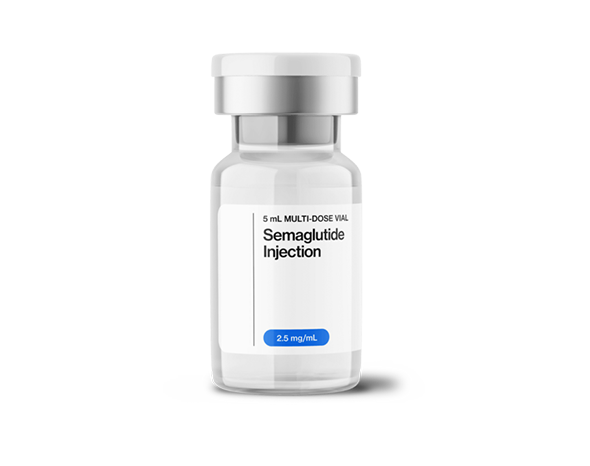- Home
- Growth Hormone
- Growth Hormone
- Growth Hormone Deficiency
- Growth Hormone Therapy
- Growth Hormone Injections
get startedThe Most Effective Hormone Replacement TherapiesHow Long Does Semaglutide Stay in Your System?
Semaglutide has been proven in clinical outcomes to be quite effective for weight loss. Medical professionals and clinical trials have found people losing dozens of pounds in just a few short months on this remarkable weight loss medication. The most significant fat reduction occurred when people were on the drug for twelve to eighteen months, with study participants dropping as much as 16% of their total body weight over that period of time.
Getting rid of excess weight is not the only benefit of having semaglutide in your system. Additional benefits include its ability to help manage blood sugar levels, help lower blood pressure and improve cardiovascular health. There may even by psychological benefits as people begin to feel better about themselves as they shed significant pounds.
Semaglutide for obesity is given via subcutaneous injection in a weekly dose. But how long does this medication stay in your body? What happens when you stop using it, and are there ways to maintain your benefits of weight loss even after the drug is out of your system?
Drug Half Lives: How Long Does Semaglutide Stay in Your Body
Semaglutide is considered a long-term medication for obese patients.. How long any drug or chemical remains in your body depends on the substance’s “half-life.” A drug’s half-life is the amount of time it takes for the concentration of the drug in the body to be reduced to half of its original level.
Semaglutide belongs to a class of drugs known as GLP-1 agonists. Almost all GLP-1 medications started life as diabetes medications because they treat diabetes in adults by stimulating insulin secretion. In fact, semaglutide is the active ingredient in Ozempic, a popular diabetes drug that may very well have started the current booming weight loss prescription drug market. These achieve their therapeutic effects by mimicking the actions of GLP-1 the natural hormone in the body that regulates glucose metabolism and gastric emptying. Because GLP-1 agonists make you feel fuller longer, you eat much less and can achieve your weight loss goals. Maximum weight loss on the drug occurs when you combine you daily injections with a regular exercise routine.
Let’s take a closer look at how long semaglutide stays in your body.
How Often Do You Take Semaglutide?
Semaglutide is given as a once-weekly injection. It was designed for consistent, long-term use. It is a “long-lasting” medication, which is why you only have to take a single weekly dose to achieve results. How long the medication stays in your system is dependent on the drug’s “half-life.” The half-life of semaglutide is seven days, which means after one week, there will be 50% of the dose you took still in your body. This also means that even once you completely stop taking this drug, it will take about seven weeks – or nearly two months before it will be totally out of your system.
How Long Do You Have to Take Semaglutide?
How long you need to take once-weekly subcutaneous semaglutide injections will vary from patient to patient. Your health care provider will determine how long you need to remain on semaglutide based on your individual needs and weight loss goals. However, depending on your progress and response to the medication, treatment with once-weekly semaglutide will usually last at least a year or longer,
You do not have to stay on this weight loss drug forever to meet your weight loss goals. Semaglutide remains in your body for almost two months after your last dose and can still provide all of its many weight loss effects.. This long half life is one of the reasons that most patients find it easy to maintain their weight loss even once they have stopped taking it.
Still, you should not stop taking this medication without the advice of your health care provider. The drug has been designed for long-term use, and you can stay on it for maintenance even once you have achieved your weight loss goals, but there may be some reasons beyond your control and some unwanted effects after withdrawal if you cease use without proper medical advice.
Does Your Dose Impact How Long Semaglutide Stays in Your System?
How long it stays in your system is impacted by your dose of semaglutide. The doses of semaglutide for weight loss are somewhat different than those prescribed originally for diabetes treatment
This medication is generally prescribed in five different strengths for eligible patients. You will likely start out at a dose of 0.25 mg once a week and increase the dose every 4 weeks until you reach the full dose of 2.4 mg which was the maximum effective dose in weight loss subjects. Recent pharmacokinetic studies of oral semaglutide found that once you are in the range of the higher maintenance doses, the drug stays in the body longer than the lower doses taken at the beginning of your weight loss journey. While this particular study was of a different administration route, the results are the same for semaglutide injections.
What Happens When Semaglutide Is No Longer in Your System?
While it can stay in your system for up to two months, even once you stop, weight regain is possible once semaglutide is no longer in your bloodstream. In the clinical trials, some patients gained as much as 7% of their total body weight back after being off of the medication for one year.
However, just because you can regain weight after stopping semaglutide, that doesn’t mean you will do so. Once it is completely out of your system, your appetite may come back, but hopefully, the other lifestyle changes you have made along the way will help you maintain your weight loss even after you stop using this weight loss drug.
Side Effects and Withdrawal Symptoms
Regaining weight after stopping GLP-1 medication is no different than once you complete any other weight loss routine or regimen. If you do not want to remain on the drug forever, then it is up to you to make the necessary lifestyle changes to keep the progress you have made. Also, keep in mind that once you stop taking semaglutide, if you have been experiencing and adverse effects like gas, acid reflux, dry mouth nausea, or any other unpleasant side effects, these should stop.
You should not attempt to shorten how long semaglutide stays in your system by deciding to stop taking it on your own. Discontinuing the drug could cause withdrawal effects and should only be done under the supervision and guidance of your health provider. Stopping abruptly or going "cold turkey" can have adverse effects on your health, blood glucose levels, and other cardiometabolic effects.
Here’s how you should stop taking semaglutide:
- Consult Your Health Professional: Before discontinuing any once-weekly human GLP-1 analogue. Discuss your reasons for wanting to stop the medication and any concerns you may have with your prescriber.
- Gradual Tapering: In most cases, your health provider will recommend a gradual tapering off of the medication. This means reducing the dosage over a period of time rather than abruptly stopping it. The tapering process allows your body to adjust to the change and minimizes potential withdrawal symptoms.
- Follow Medical Advice: Your health care provider will create a personalized plan for tapering off taking into account your specific circumstances. It’s crucial to follow their instructions precisely and communicate any side effects or concerns throughout the process.
If you were taking semaglutide for type 2 diabetes rather than weight reduction, your body may have a tougher time managing your blood sugar levels once it is no longer in your system.
Maintaining Results After Your Last Dose of Semaglutide
Always keep in mind that weight management is a lifelong journey, and no matter how long semaglutide stays in your body, discontinuing doesn’t necessarily mean you will regain weight. Maintaining weight loss after discontinuing requires a holistic approach to health and wellness. Here are five tips to help you keep the weight off once the drug is no longer in your system.
- Healthy Eating: Continue to prioritize a balanced and nutritious diet. Focus on whole foods, plenty of vegetables, lean proteins, and whole grains. Avoid excessive consumption of highly processed or sugary foods.
- Regular Exercise: Incorporate regular physical activity into your routine. Aim for a mix of cardiovascular exercises, strength training, and flexibility exercises to promote overall health and prevent weight regain.
- Portion Control: Be mindful of portion sizes to avoid overeating. Pay attention to hunger and fullness cues and avoid eating out of boredom or stress.
- Stress Management: Develop effective stress management techniques such as meditation, yoga, or deep breathing exercises to prevent emotional eating.
- Get Enough Sleep: Disturbed sleep or conditions causing sleep deprivation have been linked to weight gain.
- Support and Accountability: Maintain regular check-ins with your healthcare provider or a registered dietitian. Consider joining a support group or enlisting the support of friends and family to stay on track.
If you had to stop weekly administration of semaglutide due to side effects or were unhappy with your results, you may want to try taking another weight loss drug. There are alternative weight loss medications now available. Please contact us today, and we would be happy to discuss your medical weight loss options!
read this next
What are the side effects of Testosterone injections?
It is normal to wonder about the side effects of testosterone injections. However, you should not let concern about testosterone injection side effects, keep…read moreHow to Stop Testosterone Therapy
You can stop Testosterone Replacement Therapy (TRT) but there is a right way and a wrong way to do so to avoid health issues…read moreHow Long Do You Need to Take Testosterone Therapy?
Sometimes people are afraid to start testosterone therapy because they think it means they will have to continue testosterone therapy for the rest of…read moreSide Effects of Growth Hormone Injections
The idea of taking growth hormone injections can make some people nervous. There are people who are simply afraid of needles, and then there…read more - Growth Hormone Therapy































